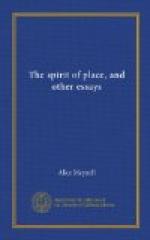Seeing that Olivia (with her chance-recovered virtue) and Sophia may both be expected to grow into the kind of matronhood represented by their mother, it needs all the conditions of fiction to surround the close of their love-affairs with the least semblance of dignity. Nor, in fact, can it be said that the final winning of Sophia is an incident that errs by too much dignity. The scene is that in which Burchell, revealed as Sir William Thornhill, feigns to offer her in marriage to the good-natured rogue, Jenkinson, fellow prisoner with her father, in order that, on her indignant and distressed refusal, he may surprise her agreeably by crying, “What? Not have him? If that be the case, I think I must have you myself.” Even for an avowedly eccentric master of whims, this is playing with forbidden ironies. True, he catches her to his breast with ardour, and calls her “sensible.” “Such sense and such heavenly beauty,” finally exclaims the happy man. Let us make him a present of the heavenly beauty. It is the only thing not disproved, not dispraised, not disgraced, by a candid study of the Ladies of the Idyll.
A DERIVATION
By what obscure cause, through what ill-directed industry, and under the constraint of what disabling hands, had the language of English poetry grown, for an age, so rigid that a natural writer at the end of the eighteenth century had much ado to tell a simple story in sufficient verse? All the vital exercise of the seventeenth century had left the language buoyant; it was as elastic as deep and mobile waters; then followed the grip of that incapacitating later style. Much later, English has been so used as to become flaccid—it has been stretched, as it were, beyond its power of rebound, or certainly beyond its power of rebound in common use (for when a master writes he always uses a tongue that has suffered nothing). It is in our own day that English has been so over-strained. In Crabbe’s day it had been effectually curbed, hindered, and hampered, and it cannot be said of Crabbe that he was a master who takes natural possession of a language that has suffered nothing. He was evidently a man of talent who had to take his part with the times, subject to history. To call him a poet was a mere convention. There seems to be not a single moment of poetry in his work, and assuredly if he had known the earlier signification of the word he would have been the last man to claim the incongruous title of poet. But it is impossible to state the question as it would have presented itself to Crabbe or to any other writer of his quality entering into the same inheritance of English.




